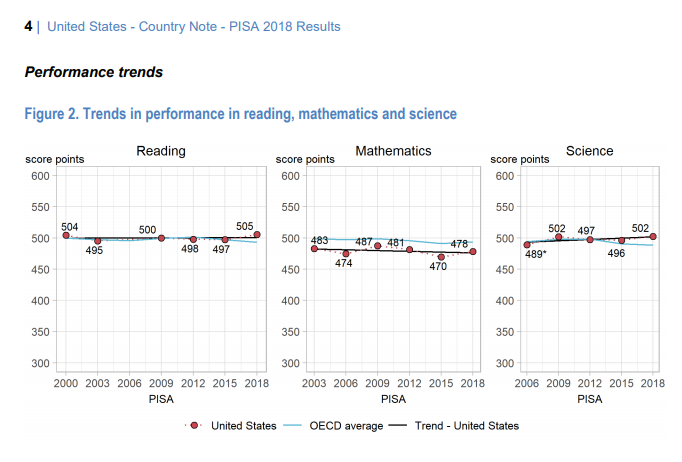This article, from 2017, is by Curmudgucation (retired English teacher Peter Greene), and is a great summary of the actual results of the Common Core movement. He reprinted it today (12/29/2023).
=================
I’ve said often that the Common Core failed in its creators’ central goal– to establish a set of national standards followed “with fidelity” by every school from Maine to Alaska. Every school would follow the exact same set of learning goals so that a child who left Iowa to attend school in Florida could make the switch without missing a step. The standards would be set in cement (remember the rule that a state could only add 15% additional Stuff) and we would all march together in lockstep into a fully-standardized perfect education future.
But the Core was revealed as both political kryptonite and amateur-hour educational junk. It entered the Bad Policy Witness Protection Program and took up residence in many states under an assumed name. Also, states took about five minutes to realize they could go ahead and rewrite, alter and add anything they damn well felt like.
David Coleman’s dream of fifty states all yoked to his vision was dead.
But something else was not dead, and is, in regrettable fact, very much alive.

Once upon a time, school districts would plan curriculum, the whole scope and sequence and pedagogical approach as well as the actual content– they would do all of that by consulting the experts that they had already hired. Maybe a curriculum director if they had one, or some other administrator if they didn’t. Certainly an assortment of their actual classroom teachers. Those folks might consult some other reliable sources as well as using their own professional judgment to develop the district’s educational plan.
But that was once upon a time.
Now the goal is standards-based curriculum.
Instead of curriculum conversations that begin with “What do we believe a graduate of our school district should know?” we now get conversations that begin with “Let’s take a look at the standards.” And then schools use them as a checklist. Let’s work our way down the list of standards and make sure that we have something written into the curriculum that allows us to check off each one so that we can say it’s “covered.” And let’s be double-certain when it comes to the tested standards.
Here are the questions that are not answered (and sometimes not asked) in attempts to build standards-based curriculum:
Where did these standards come from? Who wrote them, and is there some reason to believe that they know better than our own trained professionals what students in our district should learn? Are the standards based on any sort of research, and is that research valid and trustworthy?
What is not covered by the standards? Are the standards strictly focused on skills while ignoring content (spoiler alert: probably)? Are there areas of our course of study that we, in our considered professional judgment, consider vital, but which the standards do not address? And if there are any, given a finite school year, can we discuss setting aside some of the standards in order to make room for content and material that we consider important?
When the Common Core wave passed, it had swept away the notion that actual teachers and administrators are experts in education. Instead, the standards-based school district now assumes that nobody in the school system actually knows what should be taught, and that the most they can be trusted with is to “unpack” the standards and create a checklist-certified list of education activities that will meet the standards’ demands. That’s the best-case scenario. In the worst-case scenario, the district doesn’t believe that trained education professionals can be trusted with even that much, and should just be handed materials that dictate the teacher’s every move, throwing aside their professional judgment and replacing it with the judgment of some bureaucrat or textbook publisher.
Worst of all for the long run, this approach has infected schools of education who prepare their few remaining future teachers to accept this, to envision for themselves a diminished role as content delivery specialists or instructional facilitators or classroom coaches.
Common Core was pitched against a definite enemy– the teachers who insisted in teaching things in their own classroom just because they thought those things were worth teaching, the teacher who insisted on using her own professional judgment, the teacher who wanted to function as an autonomous individual. Ironically, even though the Common Core did not conquer the nation’s school districts as it had hoped, it did manage to deliver a serious defeat to its chosen enemy. We now understand in (too many) districts that we must adhere to the Standards, which have descended manna-like from some mysterious, magical higher power. They are not to be argued with or contradicted, nor will there be any discussion of the educational wisdom (or lack thereof) behind them. They are to be treated as our compass, our grail, our North Star. Teachers should sit down, shut up, and start aligning.
And that defeat of professional educators, that clampdown on teacher autonomy– that’s the one victory that Common Core State (sic) Standards can claim.

